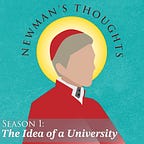Reading for Day 9: The Idea of a University, Discourse I, Introductory, § 3
Complete Recording of Discourse I @ Catholic Culture Audiobooks
Paperback with Introduction by Dr. Don Briel available @ Cluny Media
Full online text of The Idea of a University and other works by St. John Henry Newman are available @ the National Institute for Newman Studies’ Newman Reader
And here I may mention a third reason for appealing at the outset to the proceedings of Protestant bodies in regard to Liberal Education. It will serve to intimate the mode in which I propose to handle my subject altogether. Observe then, Gentlemen, I have no intention, in any thing I shall say, of bringing into the argument the authority of the Church, or any authority at all; but I shall consider the question simply on the grounds of human reason and human wisdom. I am investigating in the abstract, and am determining what is in itself right and true. For the moment I know nothing, so to say, of history. I take things as I find them; I have no concern with the past; I find myself here; I set myself to the duties I find here; I set myself to further, by every means in my power, doctrines and views, true in themselves, recognized by Catholics as such, familiar to my own mind; and to do this quite apart from the consideration of questions which have been determined without me and before me. I am here the advocate and the minister of a certain great principle; yet not merely advocate and minister, else had I not been here at all. It has been my previous keen sense and hearty reception of that principle, that has been at once the reason, as I must suppose, of my being selected for this office, and is the cause of my accepting it. I am told on authority that a principle is expedient, which I have ever felt to be true. And I argue in its behalf on its own merits, the authority, which brings me here, being my opportunity for arguing, but not the ground of my argument itself.
And a fourth reason is here suggested for consulting the history of Protestant institutions, when I am going to speak of the object and nature of University Education. It will serve to remind you, Gentlemen, that I am concerned with questions, not simply of immutable truth, but of practice and expedience. It would ill have become me to undertake a subject, on which points of dispute have arisen among persons so far above me in authority and name, in relation to a state of society, about which I have so much to learn, if it involved an appeal to sacred truths, or the determination of some imperative rule of conduct. It would have been presumptuous in me so to have acted, nor am I so acting. Even the question of the union of Theology with the secular Sciences, which is its religious side, simple as it is of solution in the abstract, has, according to difference of circumstances, been at different times differently decided. Necessity has no law, and expedience is often one form of necessity. It is no principle with sensible men, of whatever cast of opinion, to do always what is abstractedly best. Where no direct duty forbids, we may be obliged to do, as being best under circumstances, what we murmur and rise against, while we do it. We see that to attempt more is to effect less; that we must accept so much, or gain nothing; and so perforce we reconcile ourselves to what we would have far otherwise, if we could. Thus a system of what is called secular Education, in which Theology and the Sciences are taught separately, may, in a particular place or time, be the least of evils; it may be of long standing; it may be dangerous to meddle with; it may be professedly a temporary arrangement; it may be under a process of improvement; its disadvantages may be neutralized by the persons by whom, or the provisions under which, it is administered.
Hence it was, that in the early ages the Church allowed her children to attend the heathen schools for the acquisition of secular accomplishments, where, as no one can doubt, evils existed, at least as great as can attend on Mixed Education now. The gravest Fathers recommended for Christian youth the use of Pagan masters; the most saintly Bishops and most authoritative Doctors had been sent in their adolescence by Christian parents to Pagan lecture halls. And, not to take other instances, at this very time, and in this very country, as regards at least the poorer classes of the community, whose secular acquirements ever must be limited, it has seemed best to the Irish Bishops, under the circumstances, to suffer the introduction into the country of a system of Mixed Education in the schools called National. Such a state of things, however, is passing away; as regards University education at least, the highest authority has now decided that the plan, which is abstractedly best, is in this time and country also most expedient.




